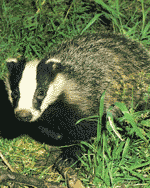 The large underground catacombs in which they live are called "setts". Badgers (Meles meles) inherit these setts from their parents, who inherited them from theirs and so forth. It is believed that some setts are actually centuries(!) old. Although studying badgers is difficult, as they mostly live underground, researchers in england excavated a sett to reveal a massive 879 meters of tunnels, 50 chambers, and 178 entrances. They estimated that its construction required the removal of 70 tons of soil! (source)
The large underground catacombs in which they live are called "setts". Badgers (Meles meles) inherit these setts from their parents, who inherited them from theirs and so forth. It is believed that some setts are actually centuries(!) old. Although studying badgers is difficult, as they mostly live underground, researchers in england excavated a sett to reveal a massive 879 meters of tunnels, 50 chambers, and 178 entrances. They estimated that its construction required the removal of 70 tons of soil! (source)
Keywords: tail , brown , black , white , pink , red , yellow
The Badger, eurasian badger is listed as Least Concern (LR/lc), lowest risk. Does not qualify for a more at risk category. Widespread and abundant taxa are included in this category, on the IUCN Red List of Threatened Species
Namings for the Eurasian badger
A young / baby of a Eurasian badger is called a 'kit'. The females are called 'sow' and males 'boar'. A Eurasian badger group is called a 'cete, colony, set or company'.Countries
Albania, Armenia, Austria, Azerbaijan, Belarus, Belgium, Bosnia and Herzegovina, Bulgaria, China, Croatia, Czech Republic, Denmark, Estonia, Finland, France, Georgia, Germany, Greece, Hungary, Iran, Iraq, Ireland, Israel, Italy, Japan, Jordan, Kazakhstan, Korea, North, Korea, South, Latvia, Lebanon, Liechtenstein, Lithuania, Luxembourg, Macedonia, Moldova, Netherlands, Norway, Poland, Portugal, Romania, Russia, Slovakia, Slovenia, Spain, Sweden, Switzerland, Syria, Turkey, Turkmenistan, Ukraine and United KingdomSome facts about the
Old World badger
Adult weight : 13 kg (28.6 lbs)
Maximum longevity : 19 years
Female maturity :365 days
Male maturity : 365 days
Gestation : 49 days
Weaning : 90 days
Litter size : 3
Litters per year : 1
Interval between litters : 365 days
Weight at birth : 0.08 kg (0.176 lbs)
Basal metabolic rate : 17 W
Body mass : 11.05 kg (24.31 lbs)
Temperature : 36.85 °C (98.33 °F)

Custom Search